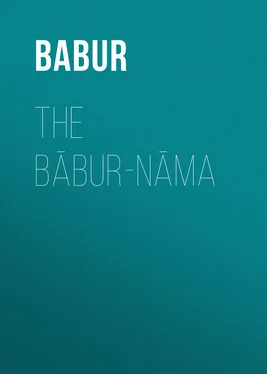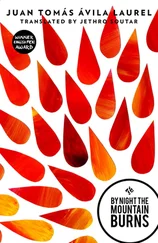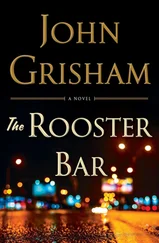Babur - The Bābur-nāma
Здесь есть возможность читать онлайн «Babur - The Bābur-nāma» — ознакомительный отрывок электронной книги совершенно бесплатно, а после прочтения отрывка купить полную версию. В некоторых случаях можно слушать аудио, скачать через торрент в формате fb2 и присутствует краткое содержание. Жанр: foreign_antique, foreign_prose, на английском языке. Описание произведения, (предисловие) а так же отзывы посетителей доступны на портале библиотеки ЛибКат.
- Название:The Bābur-nāma
- Автор:
- Жанр:
- Год:неизвестен
- ISBN:нет данных
- Рейтинг книги:4 / 5. Голосов: 1
-
Избранное:Добавить в избранное
- Отзывы:
-
Ваша оценка:
- 80
- 1
- 2
- 3
- 4
- 5
The Bābur-nāma: краткое содержание, описание и аннотация
Предлагаем к чтению аннотацию, описание, краткое содержание или предисловие (зависит от того, что написал сам автор книги «The Bābur-nāma»). Если вы не нашли необходимую информацию о книге — напишите в комментариях, мы постараемся отыскать её.
The Bābur-nāma — читать онлайн ознакомительный отрывок
Ниже представлен текст книги, разбитый по страницам. Система сохранения места последней прочитанной страницы, позволяет с удобством читать онлайн бесплатно книгу «The Bābur-nāma», без необходимости каждый раз заново искать на чём Вы остановились. Поставьте закладку, и сможете в любой момент перейти на страницу, на которой закончили чтение.
Интервал:
Закладка:
941
bīr kitta tāsh ātīmī ; var. bāsh ātīmī . If tāsh be right, the reference will probably be to the throw of a catapult.
942
Here almost certainly, a drummer, because there were two tambours and because also Bābur uses ‘aūdī & ghachakī for the other meanings of t̤ambourchi , lutanist and guitarist. The word has found its way, as tambourgi , into Childe Harold’s Pilgrimage (Canto ii, lxxii. H. B.).
943
Kābul-Ghaznī road (R.’s Notes index s. n. ).
944
var. Yārī. Tāzī is on the Ghaznī-Qalāt-i-ghilzāī road (R.’s Notes , Appendix p. 46).
945
i. e. in Kābul and in the Trans-Himalayan country.
946
These will be those against Bābur’s suzerainty done by their defence of Qalāt for Muqīm.
947
tabaqa , dynasty. By using this word Bābur shews recognition of high birth. It is noticeable that he usually writes of an Arghūn chief either simply as “Beg” or without a title. This does not appear to imply admission of equality, since he styles even his brothers and sisters Mīrzā and Begīm; nor does it shew familiarity of intercourse, since none seems to have existed between him and Ẕū’n-nūn or Muqīm. That he did not admit equality is shewn on f. 208. The T.R. styles Ẕū’n-nūn “Mīrzā”, a title by which, as also by Shāh, his descendants are found styled (A. – i-a. Blochmann, s. n. ).
948
Turkī khachar is a camel or mule used for carrying personal effects. The word has been read by some scribes as khanjar , dagger.
949
In 910 AH. he had induced Bābur to come to Kābul instead of going into Khurāsān (Ḥ.S. iii, 319); in the same year he dictated the march to Kohāt, and the rest of that disastrous travel. His real name was not Bāqī but Muḥammad Bāqir (Ḥ.S. iii, 311).
950
These transit or custom duties are so called because the dutiable articles are stamped with a t̤amghā , a wooden stamp.
951
Perhaps this word is an equivalent of Persian goshī , a tax on cattle and beasts of burden.
952
Bāqī was one only and not the head of the Lords of the Gate.
953
The choice of the number nine, links on presumably to the mystic value attached to it e. g. Tarkhāns had nine privileges; gifts were made by nines.
954
It is near Ḥasan-abdāl (A. – i-A. Jarrett, ii, 324).
955
For the farmān , f. 146b; for Gujūrs, G. of I.
956
var. Khwesh. Its water flows into the Ghūr-bund stream; it seems to be the Dara-i-Turkmān of Stanford and the Survey Maps both of which mark Janglīk. For Hazāra turbulence, f. 135b and note.
957
The repetition of aūq in this sentence can hardly be accidental.
958
t̤aur [ dara ], which I take to be Turkī, round, complete.
959
Three MSS. of the Turkī text write bīr sīmīzlūq tīwah ; but the two Persian translations have yak shuturlūq farbīh , a shuturlūq being a baggage-camel with little hair (Erskine).
960
brochettes , meat cut into large mouthfuls, spitted and roasted.
961
Perhaps he was officially an announcer; the word means also bearer of good news.
962
yīlāng , without mail, as in the common phrase yīgīt yīlāng , a bare brave.
963
aūpchīn , of horse and man (f. 113b and note).
964
Manifestly Bābur means that he twice actually helped to collect the booty.
965
This is that part of a horse covered by the two side-pieces of a Turkī saddle, from which the side-arch springs on either side (Shaw).
966
Bārān-nīng ayāghī. Except the river I have found nothing called Bārān; the village marked Baian on the French Map would suit the position; it is n.e. of Chār-yak-kār (f. 184b note).
967
i. e. prepared to fight.
968
For the Hazāra (Turkī, Mīng) on the Mīrzā’s road see Raverty’s routes from Ghaznī to the north. An account given by the Tārīkh-i-rashīdī (p. 196) of Jahāngīr’s doings is confused; its parenthetical “(at the same time)” can hardly be correct. Jahāngīr left Ghaznī now, (911 AH.), as Bābur left Kābul in 912 AH. without knowledge of Ḥusain’s death (911 AH.). Bābur had heard it (f. 183b) before Jahāngīr joined him (912 AH.); after their meeting they went on together to Herī. The petition of which the T. R. speaks as made by Jahāngīr to Bābur, that he might go into Khurāsān and help the Bāī-qarā Mīrzās must have been made after the meeting of the two at Ṣaf-hill (f. 184b).
969
The plurals they and their of the preceding sentence stand no doubt for the Mīrzā, Yūsuf and Buhlūl who all had such punishment due as would lead them to hear threat in Qāsim’s words now when all were within Bābur’s pounce.
970
These are the aīmāqs from which the fighting-men went east with Bābur in 910 AH. and the families in which Nāṣir shepherded across Hindu-kush (f. 154 and f. 155).
971
yamānlīk bīla bārdī ; cf. f. 156b and n. for its opposite, yakhshī bārdīlār ; and T. R. p. 196.
972
One might be of mail, the other of wadded cloth.
973
Chīn Ṣūfī was Ḥusain Bāī-qarā’s man (T.R. p. 204). His arduous defence, faithfulness and abandonment recall the instance of a later time when also a long road stretched between the man and the help that failed him. But the Mīrzā was old, his military strength was, admittedly, sapped by ease; hence his elder Khartum, his neglect of his Gordon.
It should be noted that no mention of the page’s fatal arrow is made by the Shaib ā n ī -n ā ma (Vambéry, p. 442), or by the T ā r ī kh-i-rash ī d ī (p. 204). Chīn Ṣūfī’s death was on the 21st of the Second Rabī 911 AH. (Aug. 22nd 1505 AD.).
974
This may be the “Baboulei” of the French Map of 1904, on the Herī-Kushk-Marūchāq road.
975
Elph. MS. f. 127; W. – i-B. I.O. 215 f. 132 and 217 f. 111b; Mems. p. 175; Méms. i, 364.
That Bābur should have given his laborious account of the Court of Herī seems due both to loyalty to a great Tīmūrid, seated in Tīmūr Beg’s place (f. 122b), and to his own interest, as a man-of-letters and connoisseur in excellence, in that ruler’s galaxy of talent. His account here opening is not complete; its sources are various; they include the Ḥab ī bu’s-siy ā r and what he will have learned himself in Herī or from members of the Bāī-qarā family, knowledgeable women some of them, who were with him in Hindūstān. The narrow scope of my notes shews that they attempt no more than to indicate further sources of information and to clear up a few obscurities.
Читать дальшеИнтервал:
Закладка:
Похожие книги на «The Bābur-nāma»
Представляем Вашему вниманию похожие книги на «The Bābur-nāma» списком для выбора. Мы отобрали схожую по названию и смыслу литературу в надежде предоставить читателям больше вариантов отыскать новые, интересные, ещё непрочитанные произведения.
Обсуждение, отзывы о книге «The Bābur-nāma» и просто собственные мнения читателей. Оставьте ваши комментарии, напишите, что Вы думаете о произведении, его смысле или главных героях. Укажите что конкретно понравилось, а что нет, и почему Вы так считаете.











